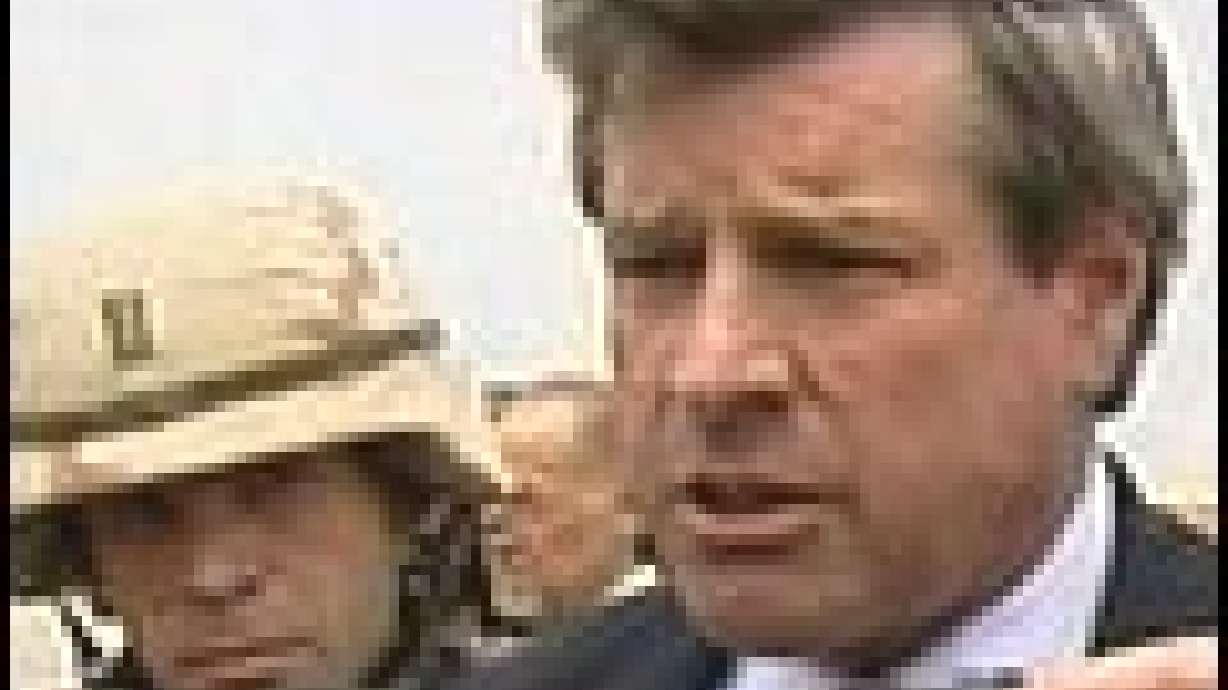Estimated read time: 5-6 minutes
This archived news story is available only for your personal, non-commercial use. Information in the story may be outdated or superseded by additional information. Reading or replaying the story in its archived form does not constitute a republication of the story.
BAGHDAD, Iraq (AP) -- U.S. administrator L. Paul Bremer escaped a rebel ambush on his convoy two weeks ago, authorities said Friday. An explosion, meanwhile, struck the office of a major Shiite party, killing an Iraqi woman.
Also on Friday, a roadside bomb exploded near a U.S. military truck outside Baghdad, wounding two U.S. soldiers, the military said.
Nobody was injured in the attack on Bremer's convoy on Dec. 6, the same day as a visit by Defense Secretary Donald Rumsfeld, a spokesman said.
Bremer was riding in an armored car near the Baghdad airport when a roadside bomb exploded and guerrillas attacked with small arms fire, but his convoy sped away, said Dan Senor, a spokesman for the U.S.-led coalition.
"As you can see, it didn't succeed," Bremer told reporters Friday in Basra.
The attack was not believed to have been a planned assassination attempt on Bremer but merely another in a series of strikes against U.S. convoys on that heavily traveled road near the airport.
Bremer has not curtailed his schedule of touring Iraq since then, and he traveled to the southern city of Basra on Friday, Senor said.
Friday's predawn attack on the Supreme Council for the Islamic Revolution Party office, which also wounded five others, came a day after Shiites buried a senior party politician assassinated Wednesday as he left his home in Baghdad.
Party officials blamed both attacks on loyalists of Saddam Hussein, who was captured by U.S. forces on Saturday.
Rahim Jabar, who lives in the building in western Baghdad, said his sister was killed and five other residents were wounded in the explosion, which brought down half of a one-story residential building that also housed a party branch office.
Supreme Council members rushed to the scene, and an anti-Saddam rally was planned in the capital later Friday.
The blast that wounded the two American soldiers was caused by a homemade bomb, said Capt. Tammy Galloway of the U.S. Army's 82nd Airborne Division.
The tanker truck blew up about 7:50 a.m., near Abu Ghraib, about 20 miles west of Baghdad, sending flames and clouds of smoke rising from the wreckage.
One witness, 19-year-old Jassim Mohammed, said he saw the bodies of two Iraqis in a damaged civilian car.
On Thursday, the military reported that rebels had killed a U.S. soldier in the first fatal ambush for the U.S. military since Saddam's capture.
The soldier was killed late Wednesday when a 1st Armored Division patrol came under fire in northwest Baghdad, the military said. A second soldier and an Iraqi interpreter were wounded.
According to official reports, 314 U.S. soldiers have been killed in combat since the war began March 20, including 199 since President Bush declared the end of major combat on May 1. Another 144 soldiers have died in non-hostile incidents, according to the Pentagon.
Some 140 U.S. soldiers from the 3rd Brigade of the 82nd Airborne Division also raided a middle-class neighborhood near Baghdad's airport overnight and arrested five of seven suspected guerrillas, the military said Friday.
They included a suspected bomb maker, said the raid commander, Capt. Joel Kostelac of Harrisburg, Pa.
Several attacks on U.S. forces and Iraqi police in recent days have claimed more than a dozen lives in Baghdad and in predominantly Sunni areas west and north of the capital, once Saddam's power base.
U.S. forces also have conducted major operations in Samarra, a focus of guerrilla resistance 60 miles north of Baghdad, since Saddam was captured.
In New York, a member of Iraq's Governing Council on Friday welcomed U.N. Secretary-General Kofi Annan's call to discuss the United Nations' role in Iraq, saying its legal expertise would help the transition to Iraqi sovereignty.
Annan said Thursday he wants the key players in Iraq, including the U.S.-appointed council and the coalition, to meet Jan. 15 and decide exactly what role they want the United Nations to play as the country moves from U.S. occupation toward self-government.
"It is important that the United Nations will play a central role in the near future," Adnan Pachachi, a member of the Governing Council, told Associated Press Television News.
Pachachi said U.N. legal expertise could help "in a constitutional process, in organizing elections, helping us to conduct a reliable and full population census."
A transitional government assumes sovereignty as scheduled by July 1.
The return of the U.N.'s international staff, pulled out in October following two bombings at U.N. headquarters, could also be on the agenda of a January meeting.
The secretary-general pulled all U.N. international staff out of Iraq in October after two bombings at U.N. headquarters in Baghdad and a series of attacks on humanitarian organizations.
Annan said he was sure the Governing Council would attend the proposed meeting, but said preliminary consultations have just begun with the coalition.
Meanwhile, Russia's Deputy Prime Minister Yuri Fedotov said the fate of Russian companies and economic interests in Iraq will affect Moscow's position in talks on relieving Baghdad's massive international debt burden.
His comments came a day after President Vladimir Putin told U.S. envoy James A. Baker III that Russia is willing to start negotiations on relieving Iraq's $8 billion in debt to Moscow, its largest creditor.
While the debt talks and the participation of Russian companies in postwar Iraq are separate issues, "progress in settling one of them will undoubtedly help reach success in talks about the other," Fedotov said.
(Copyright 2003 by The Associated Press. All Rights Reserved.)








